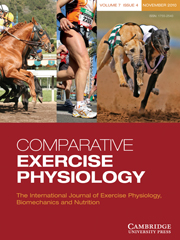Article contents
Small changes in exercise, not nutrition, often result in measurable changes in bone
Published online by Cambridge University Press: 01 February 2008
Abstract
Skeletal injuries in the equine athlete are a tremendous concern with both economic and animal welfare implications. As a result, much research has focused on improving bone quality through nutritional and exercise interventions. With the recent utilization of biochemical markers, changes in bone metabolism can be monitored. This study examined and compared the response of bone markers and estimates of bone mineral content, in studies with nutritional interventions, with those utilizing exercise interventions. The post hoc analyses suggest that nutritional interventions result in less change to bone markers and bone mineral content than exercise treatments. Of the bone markers examined, osteocalcin correlates most strongly to estimates of bone quality while keratin sulphate, an indicator of cartilage turnover, showed the least correlation. Comparing the results of this study with other published studies, similar findings were observed, suggesting that small alterations in exercise play a greater role in affecting measurable changes in bone metabolism and quality of the equine athlete than do small changes in nutrition.
- Type
- Research Paper
- Information
- Copyright
- Copyright © Cambridge University Press 2008
References
- 5
- Cited by


